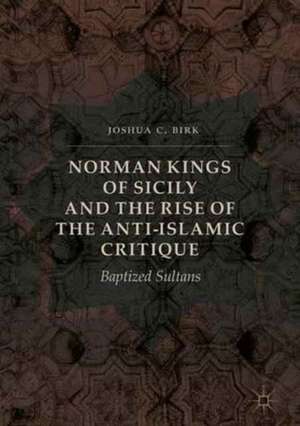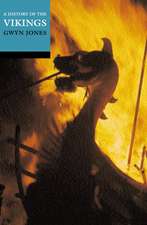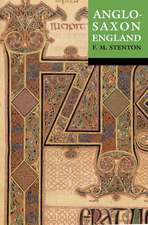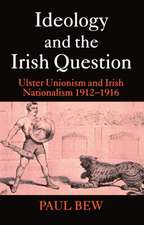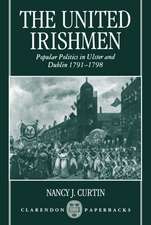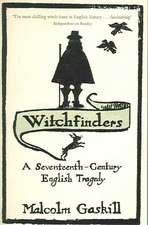Norman Kings of Sicily and the Rise of the Anti-Islamic Critique: Baptized Sultans
Autor Joshua C. Birken Limba Engleză Hardback – 18 ian 2017
| Toate formatele și edițiile | Preț | Express |
|---|---|---|
| Paperback (1) | 730.97 lei 6-8 săpt. | |
| Springer International Publishing – 13 iul 2018 | 730.97 lei 6-8 săpt. | |
| Hardback (1) | 732.40 lei 6-8 săpt. | |
| Springer International Publishing – 18 ian 2017 | 732.40 lei 6-8 săpt. |
Preț: 732.40 lei
Preț vechi: 893.16 lei
-18% Nou
Puncte Express: 1099
Preț estimativ în valută:
140.14€ • 146.32$ • 115.99£
140.14€ • 146.32$ • 115.99£
Carte tipărită la comandă
Livrare economică 04-18 aprilie
Preluare comenzi: 021 569.72.76
Specificații
ISBN-13: 9783319470412
ISBN-10: 3319470418
Pagini: 352
Ilustrații: XVI, 371 p. 3 illus.
Dimensiuni: 148 x 210 x 26 mm
Greutate: 0.58 kg
Ediția:1st ed. 2016
Editura: Springer International Publishing
Colecția Palgrave Macmillan
Locul publicării:Cham, Switzerland
ISBN-10: 3319470418
Pagini: 352
Ilustrații: XVI, 371 p. 3 illus.
Dimensiuni: 148 x 210 x 26 mm
Greutate: 0.58 kg
Ediția:1st ed. 2016
Editura: Springer International Publishing
Colecția Palgrave Macmillan
Locul publicării:Cham, Switzerland
Cuprins
1. Introduction.- 2. Saracen Soldiers: Muslim Participation in Norman Military Expeditions.- 3. A "Semi-Pagan Tyrant?".- 4. The Case of Philip of Mahdiyya - A Medieval Murder Mystery.- 5. Liminality as Centrality: The Sicilian Eunuch Tradition.- 6. Community as Collateral.- 7. The End of Muslim Sicily.- 8. Conclusion.
Notă biografică
Joshua Birk is an Assistant Professor in the History Department at Smith College, USA.
Textul de pe ultima copertă
This book is an investigative study of Christian and Islamic relations in the kingdom of Sicily during the eleventh and twelfth centuries. It has three objectives. First, it establishes how and why the Norman rulers of Sicily, all of whom were Christians, incorporated Muslim soldiers, farmers, scholars, and bureaucrats into the formation of their own royal identities and came to depend on their Muslim subjects to project and enforce their political power. Second, it examines how the Islamic influence within the Sicilian court drew little scrutiny, and even less criticism, from intellectuals in the wider world of Latin Christendom during the time period. Finally, it contextualizes and explains the eventual emergence of Christian popular violence against Muslims in Sicily in the latter half of the twelfth century and the evolution of a wider discourse of anti-Islamic sentiment throughout Western Europe.
Caracteristici
Provides a thorough and systematic analysis of the Christian approach to Islamic cultures and practices in early modern Europe Critically examines how the perception of an impermeable boundary between Christianity and Islam has been mapped onto a more culturally fluid past Appropriate for historians and religious scholars interested in the relationship between Christianity and Islam
